| Srl | Item |
| 1 |
ID:
131415
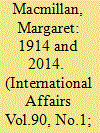

|
|
|
|
|
| Publication |
2014.
|
| Summary/Abstract |
The outbreak of the First World War remains a great historical puzzle and a source of concern, for if we do not understand how it came about we run the risk of stumbling into a similar catastrophe. This article draws parallels between the world of 1914 and the present. It starts with comfortable assumptions made by so many, then and now, that a major conflict was impossible or improbable and then looks at the paradox that globalization not only made the world more interdependent and linked, but also fostered intense local and national identities. It suggests factors that propelled Europe to war in 1914, including national rivalries, imperialism, the arms race and a shifting power balance between rising and declining powers, as well as ideologies and assumptions such as Social Darwinism and militarism, and points out that similar forces and ideas are present today. The article also stresses the dangerous complacency that can arise as a result of decision-makers having successfully dealt with a series of crises. European decision-makers also assumed that they could successfully use war as an instrument of policy and largely ignored or explained away the mounting evidence that the advantage in conflict was swinging to the defence. Again, as the author points out, there are disquieting parallels with the present.
|
|
|
|
|
|
|
|
|
|
|
|
|
|
|
|
| 2 |
ID:
131842
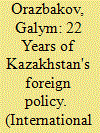

|
|
|
|
|
| Publication |
2014.
|
| Summary/Abstract |
THE LAST QUARTER of the 20th century was marked by growing globalization, which has impacted virtually all spheres of public activity. As it gained momentum, globalization has helped revitalize international collaboration, involving the world's leading economies and global international institutions.
From the early 1990s, vivid discussions unfolded in international political and scholarly circles about a new world order, the role and place of nation states and multinational TNCs in it, and the goals and methods of foreign policy amid the growing globalization. This process confronted many countries with the need to improve their competitiveness on the world market, striking an optimal balance between domestic and foreign policy.
|
|
|
|
|
|
|
|
|
|
|
|
|
|
|
|
| 3 |
ID:
113879
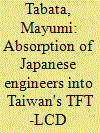

|
|
|
|
|
| Publication |
2012.
|
| Summary/Abstract |
In recent years, globalization has promoted the transnational mobility of talent from Japan to Taiwan. The Japanese Thin Film Transistor-Liquid Crystal Display industry's tacit technical knowledge flows via the Japanese talent drain, which may significantly shape Taiwan's future economic linkage with China.
|
|
|
|
|
|
|
|
|
|
|
|
|
|
|
|
| 4 |
ID:
080173


|
|
|
|
|
| Publication |
2007.
|
| Summary/Abstract |
Despite substantial evidence that international trade has promoted peace in the post-World War II era, the commercial peace research program still faces an important historical challenge. Dramatic economic integration in the nineteenth century failed to prevent the increasing interstate hostilities that culminated in the outbreak of war in 1914. This article uses a theoretical revision grounded in standard trade theory to reexamine the relationship between commerce and peace in the fifty years before World War I, a period often referred to as the first era of globalization. The article focuses on domestic conflict over commercial policy rather than on interdependence to understand the conditions under which globalization promotes peace. In a sample dating from 1865 to 1914, the authors find that lower regulatory barriers to commerce reduce participation in militarized interstate disputes. Contradicting conventional wisdom, this evidence affirms a basic premise of commercial liberalism during the first era of globalization-free trade promotes peace
|
|
|
|
|
|
|
|
|
|
|
|
|
|
|
|
| 5 |
ID:
126430
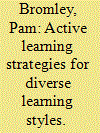

|
|
|
|
|
| Publication |
2013.
|
| Summary/Abstract |
Although political science instructors increasingly recognize the advantages of incorporating active learning activities into their teaching, simulations remain the discipline's most commonly used active learning method. While certainly a useful strategy, simulations are not the only way to bring active learning into classrooms. Indeed, because students have diverse learning styles-comprised of their discrete learning preferences-engaging them in a variety of ways is important. This article explores six active learning techniques: simulations, case studies, enhanced lectures, large group discussion, small group work, and in-class writing. Incorporating these activities into an introductory, writing-intensive seminar on globalization and surveying students about their engagement with course activities, I find that different activities appeal to students with different learning preferences and that simulations are not students most preferred activity. Bringing a broader range of active learning strategies into courses can improve teaching for all students, no matter their learning style.
|
|
|
|
|
|
|
|
|
|
|
|
|
|
|
|
| 6 |
ID:
138929


|
|
|
|
|
| Summary/Abstract |
Recent developments in globalization, education, and technology suggest exciting possibilities for cross-national active teaching and learning in international studies. This paper reviews scholarship on the potential for systematic and intentional cross-national pedagogical innovations in international studies. Three critical themes are identified and explored: culture and cross-national education, collaboration across contexts, and the need for systematic assessment. Each plays an important role in facilitating effective active teaching and learning cross-nationally. A broader examination of the opportunities and challenges of cross-national education in international studies suggests guidelines for a systematic, collaborative cross-national approach to an emerging active teaching and learning research agenda.
|
|
|
|
|
|
|
|
|
|
|
|
|
|
|
|
| 7 |
ID:
094672
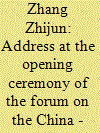

|
|
|
| 8 |
ID:
018019
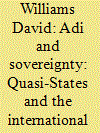

|
|
|
|
|
| Publication |
Oct 2000.
|
| Description |
557-573
|
|
|
|
|
|
|
|
|
|
|
|
|
|
|
|
| 9 |
ID:
051622


|
|
|
| 10 |
ID:
116189
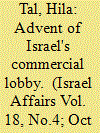

|
|
|
|
|
| Publication |
2012.
|
| Summary/Abstract |
The commercial lobby phenomenon first emerged in Israel in the 1990s and has since expanded at an impressive pace. There are more than 100 commercial lobbyists authorized to work in the Knesset, and commercial lobbyists in Israel represent more than 400 clients. This article describes the factors that led to the advent of this sector and fostered its rapid growth: globalization and Americanization; changes in the Israeli economic system; liberalization and weakened political parties; and the ban against Knesset members engaging in additional occupations. The article concludes by discussing potential developments in Israeli lobbying.
|
|
|
|
|
|
|
|
|
|
|
|
|
|
|
|
| 11 |
ID:
069183
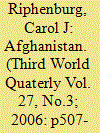

|
|
|
| 12 |
ID:
101105
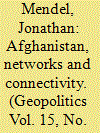

|
|
|
|
|
| Publication |
2010.
|
| Summary/Abstract |
Afghanistan is often thought to be a failed state because it is isolated from the networks of globalisation: for example, Afghanistan is viewed as part of Thomas Barnett's Non-Integrating Gap. On the contrary, the article will show that Afghanistan has - for decades - been very much integrated into a range of international networks. These networks have played major roles in Afghanistan and have also spread to have significant impact across the world: offering an example of what Friedman has referred to as the flattening of the world. Afghanistan is thus an example of the substantial role which networks and connectivity can play in 'failed' states and of the unpredictable outcomes that can result from such networks.
|
|
|
|
|
|
|
|
|
|
|
|
|
|
|
|
| 13 |
ID:
104671
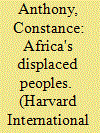

|
|
|
| 14 |
ID:
055168


|
|
|
| 15 |
ID:
145900
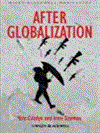

|
|
|
|
|
| Publication |
West Sussex, Wiley-Blackwell, 2011.
|
| Description |
x, 246p.pbk
|
| Standard Number |
9781118357521
|
|
|
|
|
|
|
|
|
|
|
|
Copies: C:1/I:0,R:0,Q:0
Circulation
| Accession# | Call# | Current Location | Status | Policy | Location |
| 058709 | 303.48/CAZ 058709 | Main | On Shelf | General | |
|
|
|
|
| 16 |
ID:
053817
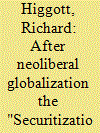

|
|
|
| 17 |
ID:
018040
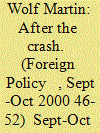

|
|
|
|
|
| Publication |
Sept-Oct 2000.
|
| Description |
46-52
|
|
|
|
|
|
|
|
|
|
|
|
|
|
|
|
| 18 |
ID:
109463
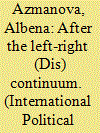

|
|
|
|
|
| Publication |
2011.
|
| Summary/Abstract |
This article examines the status of globalization as a causal factor in political mobilization and proposes a research agenda for diagnosing the impact of global socio-economic dynamics on ideological orientation in national polities. Focusing on Europe's established democracies, the article outlines recent shifts in Europe's ideological landscape and explores the mechanisms generating a new pattern of political conflict and electoral competition. It advances the hypothesis that the knowledge economy of open borders has brought about a political cleavage intimately linked to citizens' perceptions of the social impact of global economic integration. In this context, the polarization of life chances is determined by institutionally mediated exposure to both the economic opportunities and the hazards of globalization. Fostered by the increasing relevance of the international for state-bound publics, new fault-lines of social conflict are emerging, giving shape to a new, "opportunity-risk," axis of political competition. As the novel political cleavage challenges the conventional left-right divide, it is likely to radically alter Europe's ideological geography.
|
|
|
|
|
|
|
|
|
|
|
|
|
|
|
|
| 19 |
ID:
123195
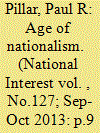

|
|
|
|
|
| Publication |
2013.
|
| Summary/Abstract |
THE URGE to apply era-defining labels to global affairs is strong and enduring. A label and a few easy-to-understand attributes associated with it can impart a reassuring simplicity to what is actually a complex and often-intractable reality. While the disadvantages of era labeling, including oversimplification, are probably as great as the advantages, the practice is here to stay.
|
|
|
|
|
|
|
|
|
|
|
|
|
|
|
|
| 20 |
ID:
052180
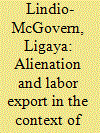

|
|
|